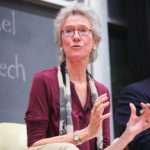Berkeley scholars talk about free speech, finding common ground
What should be considered free speech? How do we cross over an 'empathy wall'? Does speech cause harm? These are some of the questions the panel discussed Friday before a packed room

September 10, 2017
What should be considered free speech? When you think of someone speaking freely, what scene do you envision? How do we cross over an empathy wall and establish common ground? Does speech cause harm? These are some of the questions a panel of UC Berkeley scholars addressed Friday during a lively discussion on free speech in the 21st century.
The two-hour discussion, moderated by Chancellor Carol Christ, drew hundreds of students, faculty and staff, who packed into a classroom in Dwinelle Hall for the event, one of many to be held as part of Christ’s “free speech year” at Berkeley.
Following are excerpts from each panelist:
“Berkeley could be the leader in affirming free speech. To do that, we need to beef up the culture of respectful exchange.” — Arlie Hochschild, professor emerita of sociology and author of Strangers in Their Own Land: Anger and Mourning on the American Right
“This country hasn’t been this divided since the civil war… the critical question for this country is, ‘Can we have an inclusive we?’ We the people.” — john a. powell, professor of law, African American studies and ethnic studies and director of the Institute of a Fair and Inclusive Society
“Freedom has changed a lot since the concept emerged in ancient Greece and Rome. There, freedom was a privilege of the ruling class… The great contribution of our society has been to push that privilege toward a universal condition. That universal privilege, as we know, has not yet been achieved.” — David Landreth, associate professor of English
“For a democratic society or a university, the question we should argue about is this: Are there any closed questions? The principles of free speech is utter openness about anything, right? It raises the fundamental question of what are the boundaries of what a society can tolerate, while preserving itself.” — Steven Hayward, visiting scholar with the Institute of Governmental Studies
“If we’re really going to have academic freedom, all ideas and views have to be expressed. The alternative to that is for a campus to be able to say, ‘This is the truth as we see it and any other viewpoint we can prevent and punish.” — Berkeley Law Dean Erwin Chemerinsky




